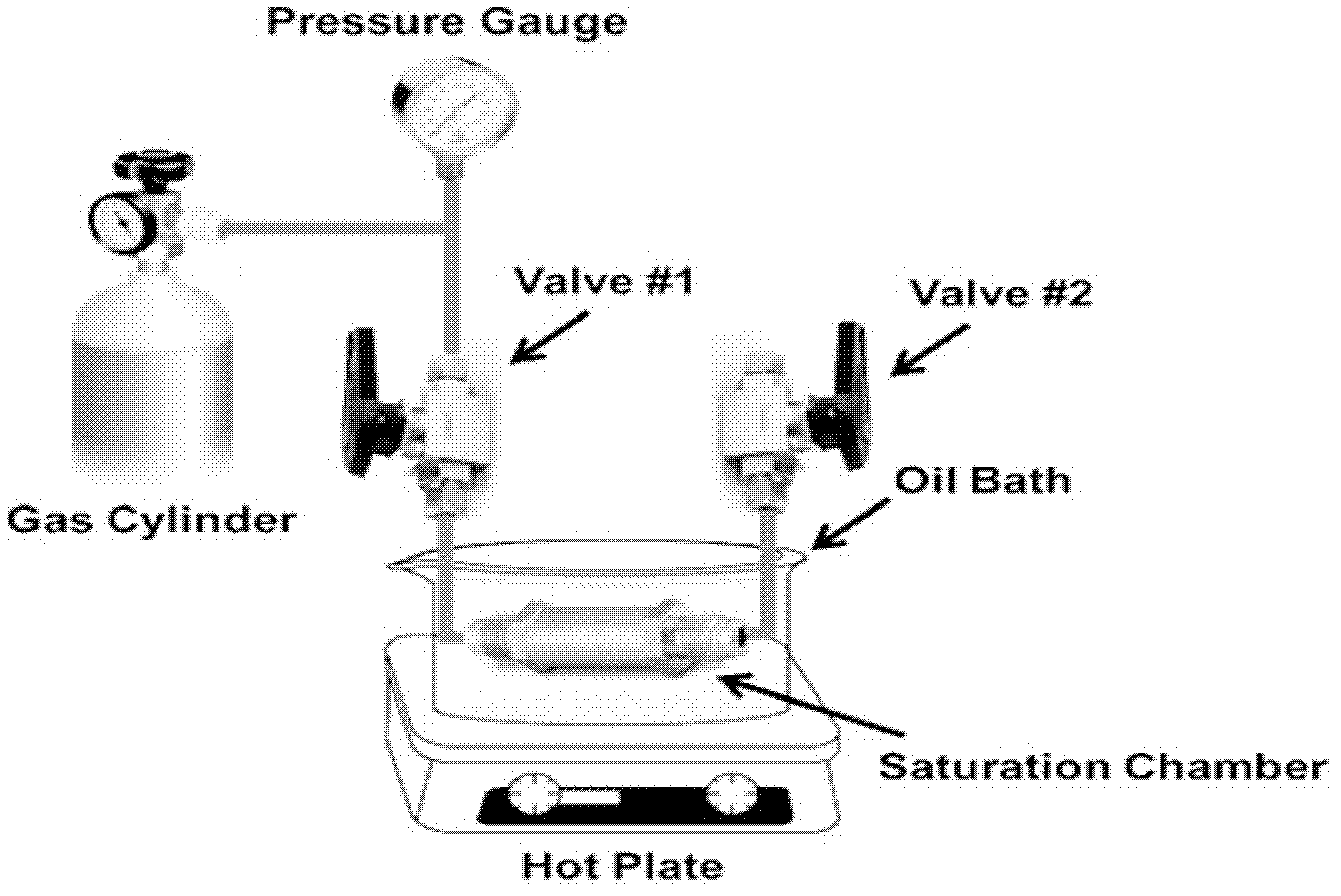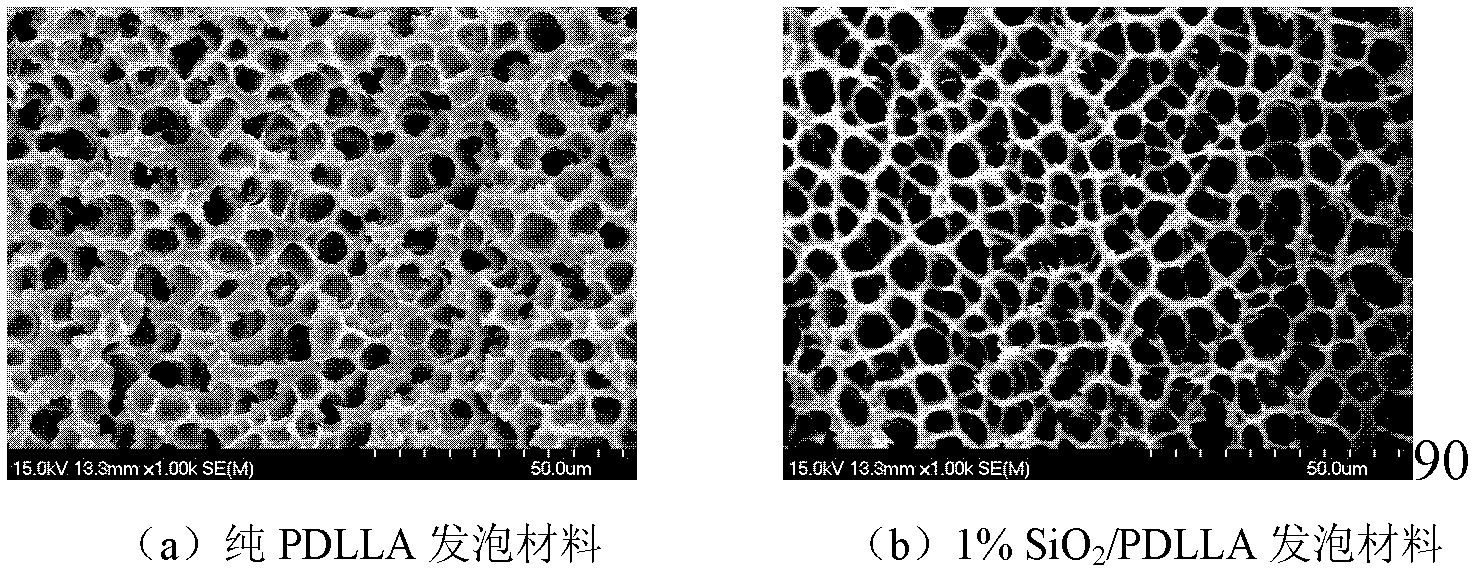Method for preparing meso-porous silica/polylactic acid foamed material by supercritical CO2 foaming
A foaming technology of mesoporous silica and polylactic acid, which is applied in the field of supercritical CO2 foaming to prepare mesoporous silica/polylactic acid foaming materials, can solve problems that have never occurred before, and achieve high and uniform cell density The effect of simple cell size and foaming process
- Summary
- Abstract
- Description
- Claims
- Application Information
AI Technical Summary
Problems solved by technology
Method used
Image
Examples
Embodiment 1
[0033] The raw material components are 50g of racemic polylactic acid (PDLLA, NatureWork), 0.5g of mesoporous silica (accounting for 1% of the total weight, the pore size is 8.0nm, and the specific surface area is 890m). 2 / g, hole volume 1.42m 3 / g), 300 g of tetrahydrofuran (THF, analytical grade).
[0034] The polylactic acid and mesoporous silica were added to tetrahydrofuran, the solution was heated to 60 °C, stirred thoroughly for 2 h, and 360 mL of ethanol was added to the solution to precipitate a crude mixture; the obtained crude mixture was washed with ethanol, dried at 40 °C, and used a flat plate. The vulcanizer was molded, the temperature of the flat vulcanizer was 175 °C, the pressure was 10 MPa, and the pressure holding time was 8 min; the molded sample was placed in a supercritical state of CO. 2 Swelling in the fluid, the swelling time is 10h, the swelling temperature is 120°C, and the swelling pressure is 15Mpa; finally, the CO in the material is released by...
Embodiment 2
[0038] The raw material components are calculated by weight ratio: racemic polylactic acid 50g (PDLLA, NatureWork), 1.5g mesoporous silica (accounting for 3% of the total weight, pore size is 10.0nm, specific surface area 950m 2 / g, hole volume 1.57m 3 / g), 350 g of tetrahydrofuran (THF, analytical grade).
[0039] The polylactic acid and mesoporous silica were added to tetrahydrofuran, the solution was heated to 65°C, fully stirred for 1.5 h, and 400 mL of ethanol was added to the solution to precipitate a crude mixture; the obtained crude mixture was washed with ethanol, dried at 60°C, and used The flat vulcanizer was used for compression molding. The temperature of the flat vulcanizer was 175 °C, the pressure was 10 MPa, and the pressure holding time was 7 min; the molded sample was placed in a supercritical state of CO. 2 Swelling in the fluid, the swelling time is 10h, the swelling temperature is 122°C, and the swelling pressure is 14Mpa; finally, the CO in the material ...
Embodiment 3
[0043] The raw material components are calculated by weight ratio: racemic polylactic acid 50g (PDLLA, NatureWork), 2.6g mesoporous silica (accounting for 5% of the total weight, pore size is 14.0nm, specific surface area 967m 2 / g, hole volume 1.72m 3 / g), 250 g of tetrahydrofuran (THF, analytical grade).
[0044] Polylactic acid and mesoporous silica were added to tetrahydrofuran, the solution was heated to 50 °C, stirred thoroughly for 3 h, and 425 mL of ethanol was added to the solution to precipitate a crude mixture; then the obtained crude mixture was washed with ethanol, dried at 50 °C, and used a flat plate The vulcanizer was used for compression molding. The temperature of the flat vulcanizer was 185 °C, the pressure was 12 MPa, and the pressure holding time was 6 min; the molded sample was placed in a supercritical state of CO. 2 Swelling in the fluid, the swelling time is 12h, the swelling temperature is 126°C, and the swelling pressure is 15Mpa; finally, the CO in...
PUM
| Property | Measurement | Unit |
|---|---|---|
| pore size | aaaaa | aaaaa |
| specific surface area | aaaaa | aaaaa |
| pore size | aaaaa | aaaaa |
Abstract
Description
Claims
Application Information
 Login to View More
Login to View More - R&D
- Intellectual Property
- Life Sciences
- Materials
- Tech Scout
- Unparalleled Data Quality
- Higher Quality Content
- 60% Fewer Hallucinations
Browse by: Latest US Patents, China's latest patents, Technical Efficacy Thesaurus, Application Domain, Technology Topic, Popular Technical Reports.
© 2025 PatSnap. All rights reserved.Legal|Privacy policy|Modern Slavery Act Transparency Statement|Sitemap|About US| Contact US: help@patsnap.com



